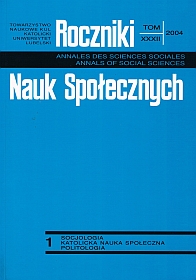Unemployment of the Intelligentsia as a Social Problem of Political Character
Abstract
At the moment we are observing some disturbing phenomena in our country: social pathologies in different varieties (they are more and more often understood and treated like social problems by those who are astonished and angry with everyday life; crisis of authorities in many spheres of interhuman life is more and more often defined as a testimony of what is “going wrong in the Danish state.” The number of people affected by progressive pauperisation is growing, there is a large group of unemployed the population of people living in the fringes of the society is going up. Such disturbing circumstances become factors of the climate that adds to the feeling of dissatisfaction and leads to “social unrest” and “social outbursts.” For the time being, the society is silent, it utters murmurs and manifests single acts of protest. This kind of silence should in no way be an evidence that people have no wishes (which they may easily turn into unconditional demands) and that they do not pass judgements on the elite, establishment and institution as they deserve it. One of the ways to predict the directions and contents of the events to come within the global society is to analyse and interpret the “basic problem” – the main social problem. The continuity of stabilisation or destabilisation of the system of communal life depends on whether this problem is solve or not. Without solving the “basic problem” it is impossible to continue the hitherto social order with its elite governing and leading the masses. I claim that in Poland now the “basic problem” is unemployment. The reason for this is as follows: the scale of unemployment as a social phenomenon and the tendency for the people without work to grow, the increasing number of the percentage of unemployed intellectuals. The latter factor adds to the significance of the problem, for it reveals the truth that there are many people with diplomas – they testify to their knowledge and skills at the highest level – and yet there is no job for such people. The results of long-term unemployment is socially very harmful. I claim that the political elite 1) cannot turn the system of communal life into such a world in which a man with a university diploma is appreciated and respectively used in the system of the “division of social work”; 2) it wastes a large part of the mental capital of our society, a fact that has a negative effect on the state of culture. In the future (rather sooner than later) “structural unemployment” will result in a hotbed of anti-elite (alternative elite). Unemployed and revolted intellectuals find their place in it. In the circumstances of a progressive crisis that affects the system they may be useful as ideologists and leaders of the movement on behalf of a radical change of the political system. Part of them that do not work as “traditional intelligentsia” (technicians – specialists who have their jobs under various political elites and accept the status quo formula and style of their acting) become “critical intelligentsia” and “revolted intelligentsia.” These people eagerly and easily turn into the movement of “limited intelligentsia” on behalf of the change of the political system. They join the new “historical block,” i.e. the alliance of social forces acting on behalf of the replacement of the status quo by an alternative order with an alternative elite. In the case of Poland what comes into play here is the movement of behalf of the transformation of society with respect to economy and political system – the movement on behalf of the defence of national interests and aspirations, on behalf of keeping Poles in their identity that stems from Christian and Latin values. At the moment in Poland there is no intelligentsia as a form of ethos. It is worth reflecting whether this movement of national regeneration is capable of bringing about a new intelligentsia as an ethos-like vanguard of the reform that draws on tradition.
References
Bell D.: Dwanaście sposobów przewidywania w naukach społecznych, tł. H. Krzyżanowski, Warszawa 1966.
BlumerH.: Niepokój społeczny i protest zbiorowy, tł. E. Hałas, [w:] E. Hałas, Obywatelska socjologia szkoły chicagowskiej, Lublin 1994, s. 97-118.
Bocheński J. M.: Co to jest autorytet?, [w:] tenże, Logika i filozofia. Wybór pism, Warszawa 1993, s. 243.
Bukowski W.: I powraca wiatr..., tł. A. Mietkowski, Warszawa 1990.
Camus A.: Człowiek zbuntowany, tł. J. Guze, Warszawa 2002, s. 17.
Canguilhem G.: Normalne i patologiczne, tł. P. Pieniążek, Gdańsk 2000.
Conquest R.: Uwagi o spustoszonym stuleciu, tł. T. Bieroń, Poznań 2002.
Durkheim E.: O podziale pracy społecznej, tł. H. Wakar, Warszawa 2000.
Encyklika Ojca Świętego Jana Pawła II O pracy ludzkiej Laborem exercens, Wrocław 1995.
Goćkowski J.: Problemy społeczne życia naukowego, [w:] Zagrożenia społeczne iwarunki oraz środki ich przezwyciężania, („Polska 2000”, 2/86, cz. II), Ossolineum 1987.
Gramsci A.: Intelektualiści i organizowanie kultury, tł. B. Sieroszewska, [w:] tenże, Pisma wybrane, t. 1, Warszawa 1961, s. 685-737.
Hałas E.: Transformacja w wyobraźni zbiorowej, [w:] Symbole w interakcji, Warszawa 2001.
Kuhn T. S.: Dwa bieguny. Tradycja i nowatorstwo w badaniach naukowych, tł. S. Amsterdamski, Warszawa 1985.
Malinowski B.: Wolność i cywilizacja, tł. J. Mucha, [w:]tenże, Dzieła, t. 10, Warszawa 2001, s. 27-325.
Mannheim K.: Człowiek i społeczeństwo w dobie przebudowy, tł. A. Rażniewski, Warszawa 1974.
Naisbitt J.: Megatrendy, tł. P. Kwiatkowski, Poznań 1997.
Ossowska M.: Normy moralne. Próba systematyzacji, Warszawa 1970.
Ossowski S.: Taktyka i kultura, [w:] J. Karpiński, Nie być w myśleniu posłusznym. Ossowscy, socjologia, filozofia, Londyn 1989, s.129-139.
Woźniak A.: Jeszcze ideologia czy już utopia, „Universitas”, 1998, nr 21, s. 72-78.
Copyright (c) 2004 Roczniki Nauk Społecznych

This work is licensed under a Creative Commons Attribution-NonCommercial-NoDerivatives 4.0 International License.


